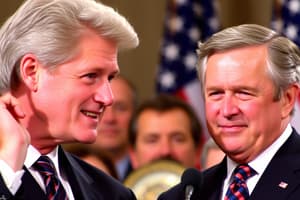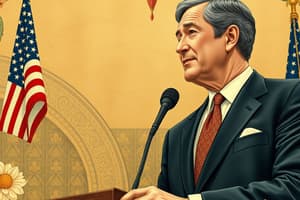Podcast
Questions and Answers
What was the main focus of Al Gore's economic policy during the 2000 election?
What was the main focus of Al Gore's economic policy during the 2000 election?
- Raising the minimum wage
- Reducing government spending
- Implementing a flat tax rate
- Maintaining economic growth (correct)
What was the name of the Supreme Court case that intervened in the 2000 presidential election dispute?
What was the name of the Supreme Court case that intervened in the 2000 presidential election dispute?
- Florida v. The Electoral College
- Bush v. Gore (correct)
- The Presidential Election Dispute
- Gore v. Bush
How many electoral votes did George W. Bush receive in the 2000 presidential election?
How many electoral votes did George W. Bush receive in the 2000 presidential election?
- 266
- 271 (correct)
- 270
- 269
What was the significance of the 2000 presidential election in terms of popular vote?
What was the significance of the 2000 presidential election in terms of popular vote?
What was the deciding factor in awarding Florida's electoral votes to Bush according to the Supreme Court?
What was the deciding factor in awarding Florida's electoral votes to Bush according to the Supreme Court?
Which party's candidate was a former Secretary of Defense?
Which party's candidate was a former Secretary of Defense?
What was the issue with the punch-card ballots in Florida?
What was the issue with the punch-card ballots in Florida?
Which candidate won the most states?
Which candidate won the most states?
What was the main difference between the two major candidates' approaches to international relations?
What was the main difference between the two major candidates' approaches to international relations?
Which candidate was a consumer advocate?
Which candidate was a consumer advocate?
Flashcards are hidden until you start studying
Study Notes
2000 Election
Gore vs. Bush
- Democratic candidate: Al Gore (Vice President under Bill Clinton)
- Republican candidate: George W. Bush (Governor of Texas)
Key Issues
- Economy: Gore focused on maintaining economic growth, while Bush emphasized tax cuts and limited government spending
- Healthcare: Gore advocated for a Medicare prescription drug benefit, while Bush proposed a more limited approach
- Environment: Gore emphasized the need for action on climate change, while Bush was skeptical of its severity
Controversy and Dispute
- Election night issues in Florida led to a recount of ballots, with Bush leading by a narrow margin
- Ballot design flaws in Palm Beach County, Florida, led to confusion among voters
- Gore conceded on election night, but retracted his concession as the recount began
Supreme Court Decision
- Bush v. Gore (2000): The Supreme Court intervened in the dispute, halting the recount
- 5-4 decision: The Court ruled that the recount violated the Equal Protection Clause of the 14th Amendment
- The decision effectively awarded Florida's electoral votes to Bush, securing his presidency
Electoral College
- Electoral votes: 271 needed to win; Bush received 271, Gore received 266
- Popular vote: Gore received approximately 543,895 more popular votes than Bush
- The 2000 election was the fourth in U.S. history where the winner of the popular vote did not win the presidency
2000 Election: Gore vs. Bush
- Democratic candidate: Al Gore, Vice President under Bill Clinton
- Republican candidate: George W. Bush, Governor of Texas
Key Issues
- Economy: Gore focused on maintaining economic growth; Bush emphasized tax cuts and limited government spending
- Healthcare: Gore advocated for a Medicare prescription drug benefit; Bush proposed a more limited approach
- Environment: Gore emphasized the need for action on climate change; Bush was skeptical of its severity
Controversy and Dispute
- Election night issues in Florida led to a recount of ballots, with Bush leading by a narrow margin
- Ballot design flaws in Palm Beach County, Florida, led to confusion among voters
- Gore conceded on election night, but retracted his concession as the recount began
Supreme Court Decision
- Bush v. Gore (2000): The Supreme Court intervened in the dispute, halting the recount
- 5-4 decision: The Court ruled that the recount violated the Equal Protection Clause of the 14th Amendment
- The decision effectively awarded Florida's electoral votes to Bush, securing his presidency
Electoral College
- Electoral votes: 271 needed to win; Bush received 271, Gore received 266
- Popular vote: Gore received approximately 543,895 more popular votes than Bush
- The 2000 election was the fourth in U.S. history where the winner of the popular vote did not win the presidency
2000 US Presidential Election Candidates
- Al Gore (Vice President under Bill Clinton) and Joe Lieberman (Senator from Connecticut) ran as the Democratic Party ticket.
- George W. Bush (Governor of Texas) and Dick Cheney (Former Secretary of Defense) represented the Republican Party.
- Ralph Nader (Consumer advocate) and Winona LaDuke (Environmental activist) ran on the Green Party ticket.
- Pat Buchanan (Former Republican candidate) and Ezola Foster (Teacher) represented the Reform Party.
Election Controversies
- A dispute over ballots in Florida, particularly in Palm Beach County, led to a Supreme Court decision (Bush v. Gore) that effectively ended the recount and awarded Florida's electoral votes to Bush.
- Punch-card ballots in Florida caused issues with votes being counted, with some ballots having "hanging chads" (partial perforations) that made it difficult to determine voter intent.
Election Results
- Bush won the Electoral College with 271 electoral votes to Gore's 266.
- Gore received 543,895 more popular votes than Bush (50,999,897 to 50,456,002).
- Bush won 30 states, while Gore won 20 states and Washington, D.C.
Key Issues
- Economic growth: Bush promised to cut taxes, while Gore focused on investing in education and healthcare.
- Foreign policy: Both candidates emphasized a strong national defense, but disagreed on approaches to international relations.
- Social issues: Abortion, gun control, and environmental policy were among the social issues that divided the candidates.
Aftermath
- Bush's transition team began working on policy initiatives, including tax cuts and education reform, before his inauguration.
- Gore conceded the election on December 13, 2000, after the Supreme Court's decision in Bush v. Gore.
Studying That Suits You
Use AI to generate personalized quizzes and flashcards to suit your learning preferences.




